Assassin’s Creed: Revelations Review
Posted by
SpectralShock
on
The newly released Assassin’s Creed: Revelations in the fourth title in the on-going series, one of three to be released in just as many years. Revelations is set to close the chapters in the story of Ezio and Altair, main characters from the previous games. And while fans who have been enjoying the plot of these master assassins will be thrilled to know that their respective stories are concluded with dignity, the over-arching plotline of the series which involves present-day Desmond remains as convoluted as ever. Revelations features a couple of new gameplay modes and additions to the core experience, as well as a touched up multiplayer component. It brings together almost every headlining feature from the previous games, but the overall outcome feels strangely less than the sum of its parts.
If you haven’t been involved with the series up until this point, needless to say you should play the previous games first. Because this is the conclusion of a few story threads, be warned of potential spoilers in this text. Fans that were eager to see how the final scene of Brotherhood will translate to the start of Revelations will be utterly disappointed. The dramatic and what was supposed to be a plot-defining moment of Lucy’s death in Brotherhood is completely ignored in this sequel. Desmond awakes to find himself on an island created inside the Animus, a safe heaven of sorts.
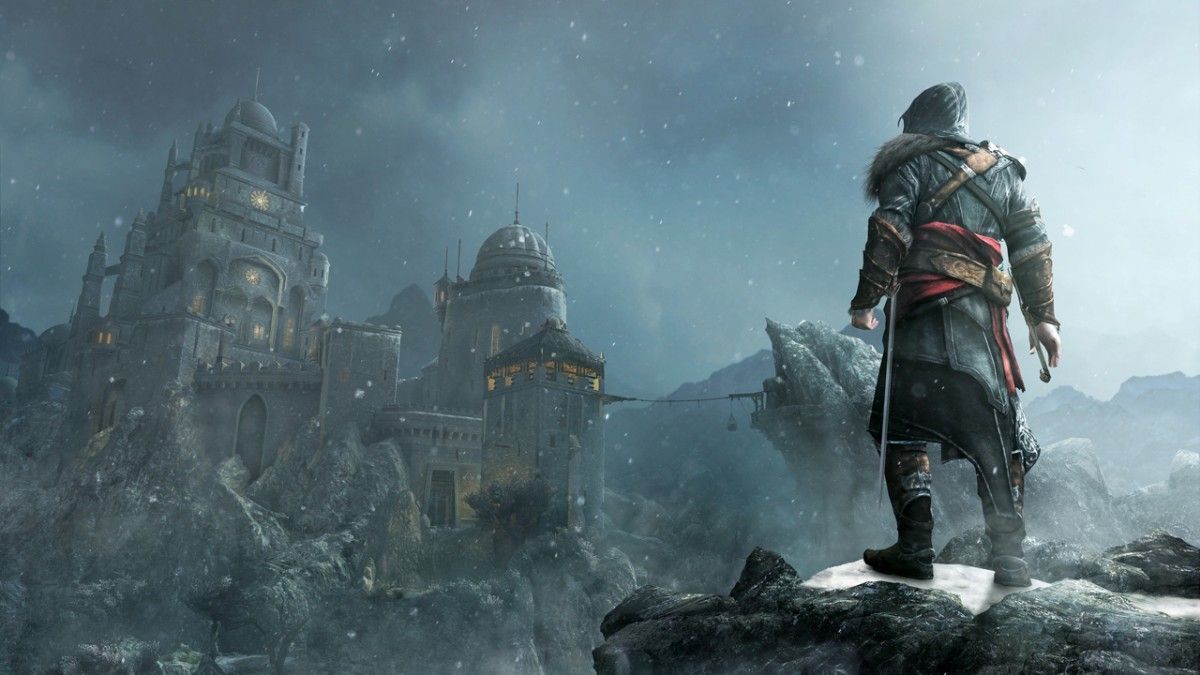
It turns out, Desmond fell into a coma right there on the crypt floor next to Lucy, and that’s where he spends all of his time in Revelations. The exposition and connection to the real world is minimal – Desmond can hear his team talk through the coma, and Lucy’s funeral is mentioned, but sadly that’s as far as it goes. There was a lot of potential for narrative exposition here, perhaps being able to eavesdrop on his team and learn some potential insights, but this is never explored. To cap off the completely underwhelming plot line, the ending of Revelations is so abrupt, it comes off as even worse than that of Assassin’s Creed II.
Thankfully, and as has been the case throughout the series, the stories of Ezio and now Altair are so much better. We pick up with Ezio almost 30 years after the events of Brotherhood in 1511AD, and our hero is now a much older man. He has spent his years searching for the secrets of the Assassin Order, which has led him to Masyaf, the ancient castle which was once headquarters to his guild, previously occupied by Altair during the events of Assassin’s Creed I. Ezio discovers that a sealed doorway likely holds the answers he seeks, but it requires five keys. The keys are said to be hidden around the city of Constantinople, and one has already been found by the Templars and must be recovered.
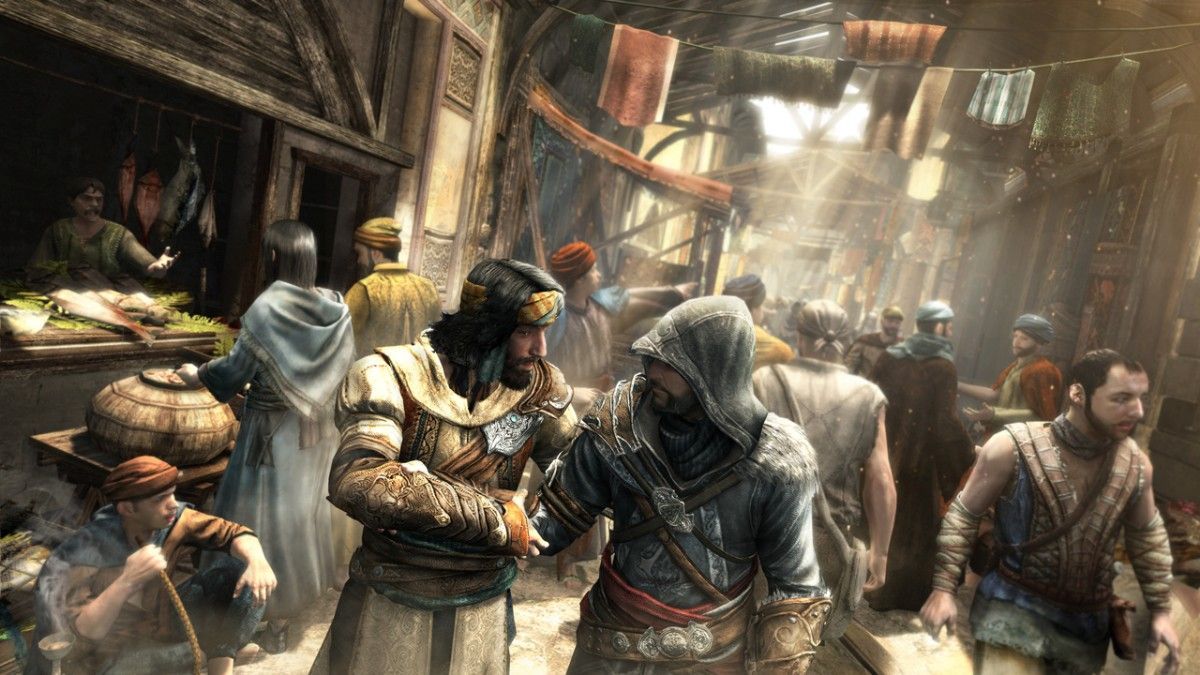
As seems similar to the setup of previous games in the series, Ezio spends the game attempting to locate and collect these keys and finally unlock his ancestor’s secrets. Ezio’s storyline is solid and runs a bit shorter than usual at 9 memory sequences. Some fans may scoff at that fact, but this lets Ezio finally have a personal, focused storyline, which is a good change of pace from the previous games. Whereas often Ezio had to be running errands for all the factions in the city in order to gain their support and help his cause, in Revelations the assassins are strong enough to finally get things done on their own and not waste time with other factions.
In addition to the solid and entertaining story of our Italian killer, each key that Ezio finds lets him peer into the life of Altair. During these sections, players get to experience key events from his life following the conclusion of Assassin’s Creed I. It’s an “Inception”-like effect, providing a lot of insight for the character during his later years. As mentioned, and without spoiling anything, the paths of Ezio and Altair do often cross, and lead to a very satisfying conclusion for the fans of the series who have been following these two heroes from the beginning.
As you may have already guessed, the gameplay in Revelations is very similar to that of Brotherhood and ACII. Controlling Ezio, players are free to explore the wonderfully recreated city of Constantinople, much as they did in Rome last year. Ezio controls in much the same way as before, as old age has barely taken a toll on his combat and platforming abilities. Scaling buildings and towers, running across rooftops and counter-attacking foes in combat is as smooth and well animated as it has always been. A couple of new additions include a hookblade and a parachute. The latter functions much in the same manner as you’d expect – having a limited number of chutes, which can be filled up at vendors, Ezio can open a chute mid-fall and safely glide to the ground. It’s a mechanic that’s mandatory during only two story missions, and is otherwise not of much use. There aren’t many reasons or opportunities to jump from particularly high objects that would provide sufficient gliding distance, and the ability to jump into a stack of hay remains much more practical.
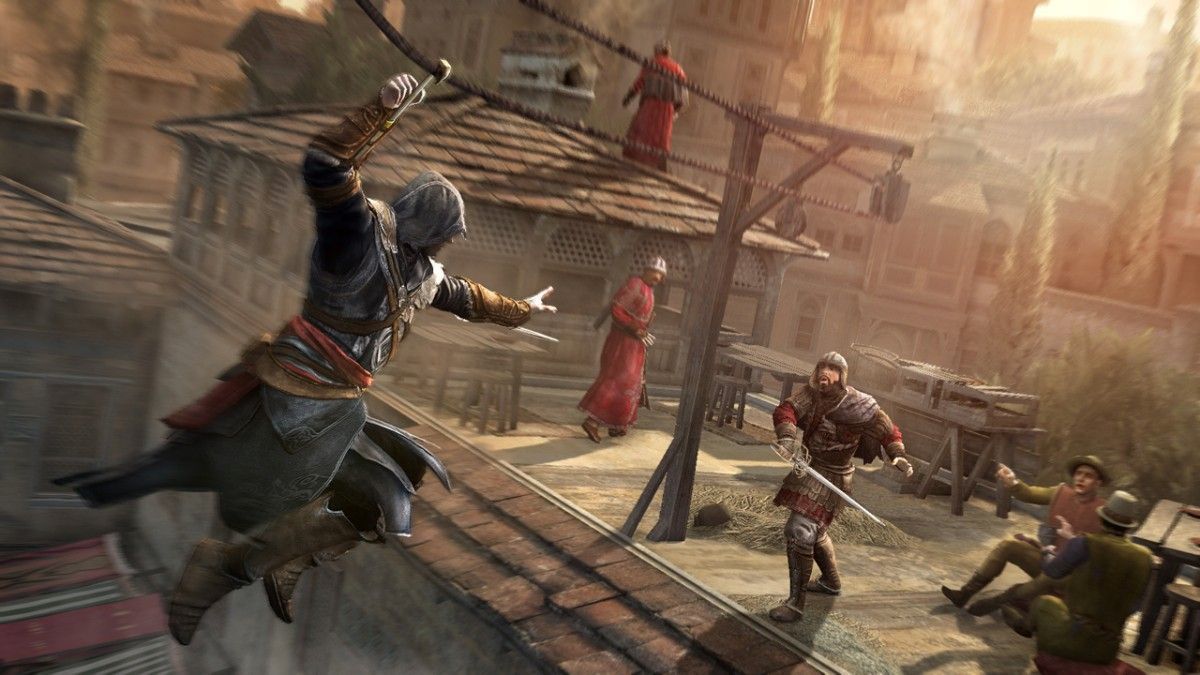
The other core gameplay addition is the hookblade, which introduces a couple of new abilities. While platforming and jumping, Ezio can extend himself further thanks to this new blade, slightly improving your chances of jumping higher and not faceplanting to the ground below after a long jump to the next rooftop. Players are required to use the blade proactively by hitting a button, so it does have an element of skill. Similarly, a couple of new combat moves with the hookblade lets players jump over their opponents, potentially killing them in the process. Zip-lines also make an appearance throughout the city, which give Ezio a Batman-like feel and an extra opportunity for aerial assassinations. The hookblade is a nice addition but it hardly revolutionizes the platforming or combat gameplay.
What’s much more prominent is the addition of bombs. Ezio can now collect ingredients and then craft bombs at various locations around the city, or purchase ready to use devices from special vendors. Bombs help elevate the gameplay in a number of ways thanks to their wide range of possible effects. Sure, there are damage-causing bombs, with sticky and delayed timing variety. More interestingly, other types of bombs include distracting, smoke, fear-inducing, and even tripwire. These add a ton of new possibilities and solutions to all of Ezio’s daily guard problems. Luring away guards or dispersing a crowd for an easier escape are some of the new possibilities that have a real impact on how you get out of tricky situations.
Many of the gameplay elements from Brotherhood make a return. The city of Constantinople is undiscovered until you visit viewpoints, shops remain closed until you renovate, and enemy influence over an area can be removed by killing the commander and then destroying his tower. Many of these elements work in the same manner, with perhaps Dens getting some upgrades, such as defense towers, which make infiltrating them more difficult. The Dens which the player owns can now be attacked by the Templars to be re-gained, and must be defended. This kicks off a very glorified take on the popular “tower defense” genre, where Ezio must stand on a rooftop and place his defenses to repel the incoming wave of enemy forces. Points earned over time are spent by placing more archers on the roofs and barricades in the street to slow down the enemy. It’s a decently fun mode, but it only kicks off when Ezio earns a high wanted level and Templars decide to attack. However, as most players will most always try to erase their wanted level to avoid the annoyance of always-hostile guards, the opportunities to play Den Defense are minimal.
In all of the Dens you control, the player can once again recruit potential assassins and send them on missions. Much like before, these assassins can be leveled up and then called upon during the game to take out a target or generally help during combat. If you enjoyed this RPG minigame of sorts as the key feature of Brotherhood, then Revelations has you covered with more of the same. The city has tons of side quests, faction missions, and other distractions which has been a series staple for a while, and there is plenty of potential for many, many gameplay hours to be had for those who haven’t had enough of similar assignments after ACII and Brotherhood.
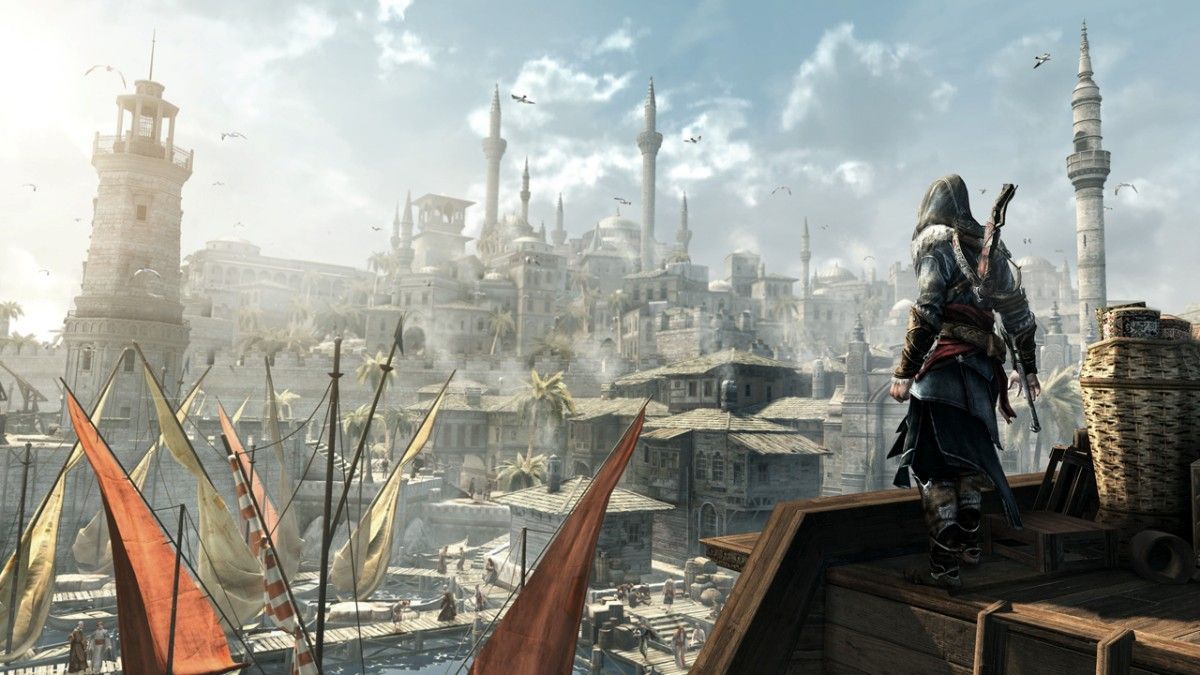
In the meantime, Desmond has little to do inside the Animus. After trying to give the character some of his own action in Brotherhood, the idea seems to have been abandoned and the developers were content with leaving him inside the coma for the whole game. To be fair, there are indeed gameplay elements which involve Desmond, and in fact they are unique to the series. Problem is, many players won’t get to experience them. The collectible feathers scattered around the game world have instead been replaced by Animus fragments – 100 of them – collecting which unlocks memories of Desmond himself.
Having collected enough, players take control of Desmond inside the animus and play through a series of challenge rooms in first person view. Here the game actually presents the biggest challenges in the whole game that are satisfying to solve. Desmond can move around and jump in these levels, and later on also create objects out of thin air, Lego-style, in order to advance. While playing through these levels, players are treated to Desmond narrating his own story, from childhood and through the modern day. These elements add up to an interesting experience and give Desmond a bit more background as a character, but again this will likely be missed by many players who don’t have the patience or skill to collect most of the fragments in the game.
The game’s fairly unique multiplayer mode of cat and mouse returns as well. Revelations does a great job with the tutorials, first letting you practice against AI and then other newbie players, before letting you out into the real thing. There are more locations and characters, with tons of customization options from visuals to perks. Many of the modes from Brotherhood return, alongside newcomers such as Capture the Flag and deathmatch. In the latter, players are given much the same tasks of eliminating others while trying to survive yourself. The difference, however, is that there is no radar, thus you’re forced to rely on your senses (visual and audio queues) to spot the target as well as escape or counter your pursuers. Deathmatch finally adds a level of intrigue and suspense to the online experience, which was otherwise previously missing because of too many UI assists.
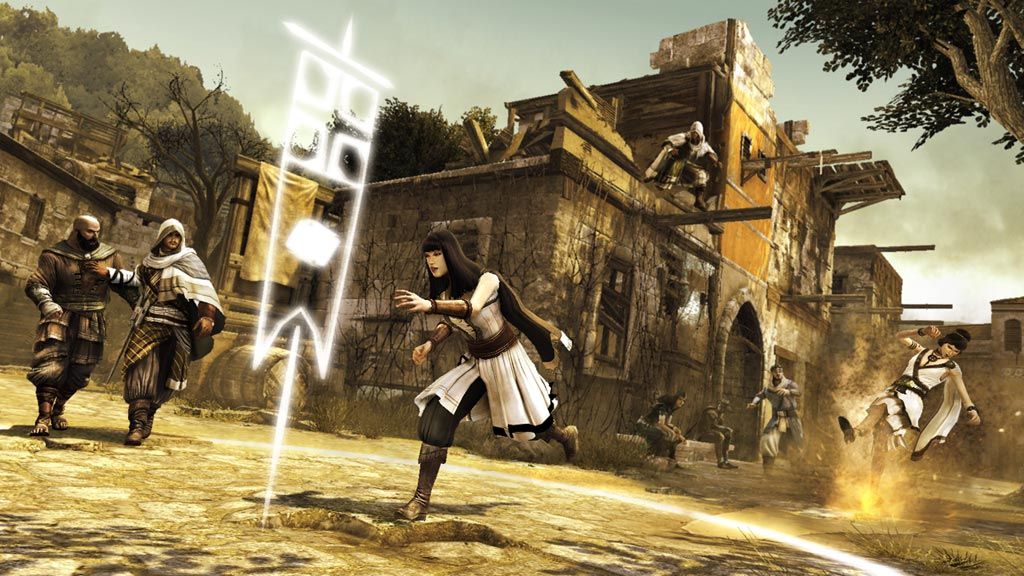
Revelations continues to use the same engine as the previous games, so the graphics are on-par and still look rather good. The draw distance is solid, though the minor textures and artifacts do pop-in occasionally. Revelations features some stellar set pieces with great backdrops that would make even Uncharted jealous, but these sequences are few and far in between. Sound effects seem to have been touched up and add a certain ambiance to the city which lend themselves well to the atmosphere. The soundtrack is also quite good, along with continued stellar voice acting for most major characters. Some dialogue, particularly for the citizens, is re-used from previous games but that’s not too big of a problem. For some reason, both Desmond and Ezio look a quite a bit different, and it isn’t because of age.
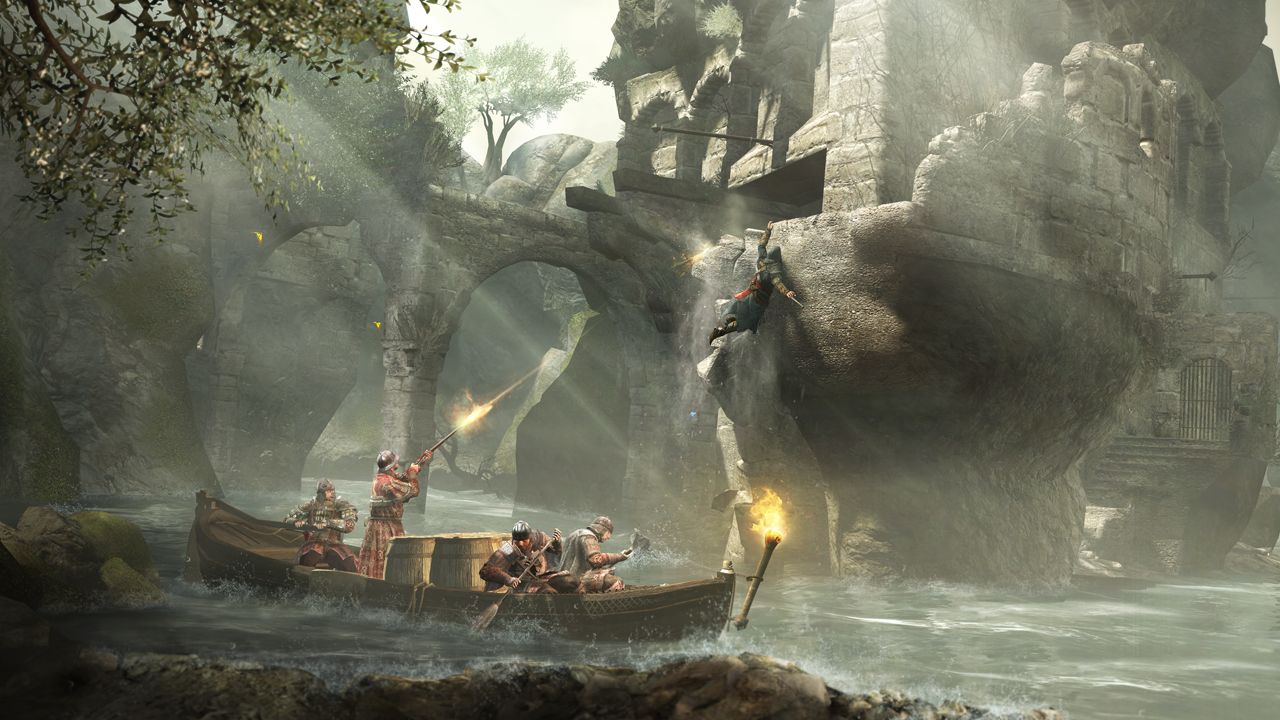
Assassin’s Creed Revelations is a title that combines all of the major elements from the previous games, and yet at times feels lesser than the sum of its parts. Like trying to fill out the back of the game box with as many features as possible, the game seems to have lost its identity when it comes to gameplay. Not to take away from the great ending of Ezio and Altair’s storylines, but it’s Desmond who is supposed to be carrying the series into the next trilogy, and his plot has been the weakest by far. Ubisoft is clearly aiming to release a new game in the series every year, but it really doesn’t feel like the franchise has enough to pull it off. If you absolutely must have a new Assassin’s Creed game, Revelations is a safe bet. However, those who have been with the series from the beginning are likely beginning to tire of the very similar experience from one title to the next. As the series is set to return next year, here’s to hoping that the franchise can reinvent itself with both story and gameplay, and re-capture the imagination of the audiences much like original Assassin’s Creed did all those years ago.
